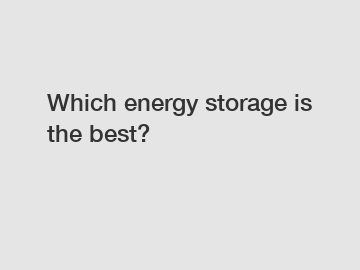Which energy storage is the best?
Which energy storage is the best?
Answer: The best energy storage solution depends on the specific needs and constraints of a particular application. Different energy storage technologies have their own unique advantages and disadvantages, and the best choice will vary based on factors such as power capacity, energy capacity, efficiency, cost, and environmental impact.
1. What are the different types of energy storage technologies?
There are several different types of energy storage technologies, including:
- Lithium-ion batteries: widely used in portable electronics and electric vehicles due to their high energy density and relatively low cost.
- Pumped hydro: uses surplus electricity to pump water uphill and then releases it through turbines to generate electricity when needed.
- Flywheels: store energy in the form of rotational kinetic energy and can provide short bursts of power when needed.
- Compressed air energy storage: stores energy by compressing air in underground caverns or tanks and then releasing it to drive turbines.
- Hydrogen storage: stores energy in the form of hydrogen gas, which can be converted back into electricity via fuel cells.
2. What are the advantages and disadvantages of each type of energy storage?
Lithium-ion batteries: Advantages include high energy density, long cycle life, and fast charging. Disadvantages include limited capacity and potential safety issues.

Pumped hydro: Advantages include high efficiency and long cycle life. Disadvantages include geographical constraints and high upfront costs.
Flywheels: Advantages include fast response times and long cycle life. Disadvantages include low energy density and high maintenance costs.
Compressed air energy storage: Advantages include low cost and large storage capacity. Disadvantages include energy losses during compression and expansion.
Hydrogen storage: Advantages include high energy density and long-term storage capabilities. Disadvantages include high cost and efficiency losses during conversion.
3. How do you determine the best energy storage solution for a particular application?
The best energy storage solution for a particular application depends on factors such as power and energy requirements, space constraints, cost considerations, and environmental impact. It is important to carefully evaluate the strengths and weaknesses of each energy storage technology and select the one that best meets the specific needs of the application.
If you want to learn more, please visit our website DIY Lifepo4 Battery Kit, DIY Units Battery Box Without Cells, DIY Units Battery Box Without Cells.


